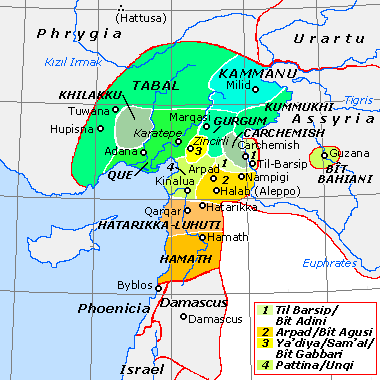Bit Bahiani | |||||||
|---|---|---|---|---|---|---|---|
| c. 1200 BC–808 BC | |||||||
 | |||||||
| Capital | Guzana | ||||||
| Common languages | Aramaic | ||||||
| Religion | Ancient Levantine Religion | ||||||
| Historical era | Iron Age | ||||||
• Established | c. 1200 BC | ||||||
• Disestablished | 808 BC | ||||||
| |||||||
| Today part of | Syria Iraq Turkey | ||||||
Bit Baḫiani was an independent Aramean city-state kingdom (c. 1200 – 808 BC) with its capital at Guzana (modern day Tell Halaf). Bit Baḫiani was ruled by King Kapara. There were at least five kings and four governors of Bit Baḫiani before losing its name in usage.[1][2]

Bit-Bahiani and other contemporary Aramean kingdoms in the 10th/9th century BC
See also
References
- ↑ Goldridge Pinches, Theophilus. The Old Testament In the Light of The Historical Records and Legends of Assyria and Babylonia. London : Society for promoting Christian Knowledge ; New York : E. & J. B. Young & Co.; 1st edition (1902). p. 321. ASIN B00514AQ6S.
- ↑ Ten Eyck Olmstead, Albert (1918). The Calculated Frightfulness of Ashur Nasir Apal. s.n. p. 229. ASIN B00514AQ6S.
This article is issued from Wikipedia. The text is licensed under Creative Commons - Attribution - Sharealike. Additional terms may apply for the media files.
